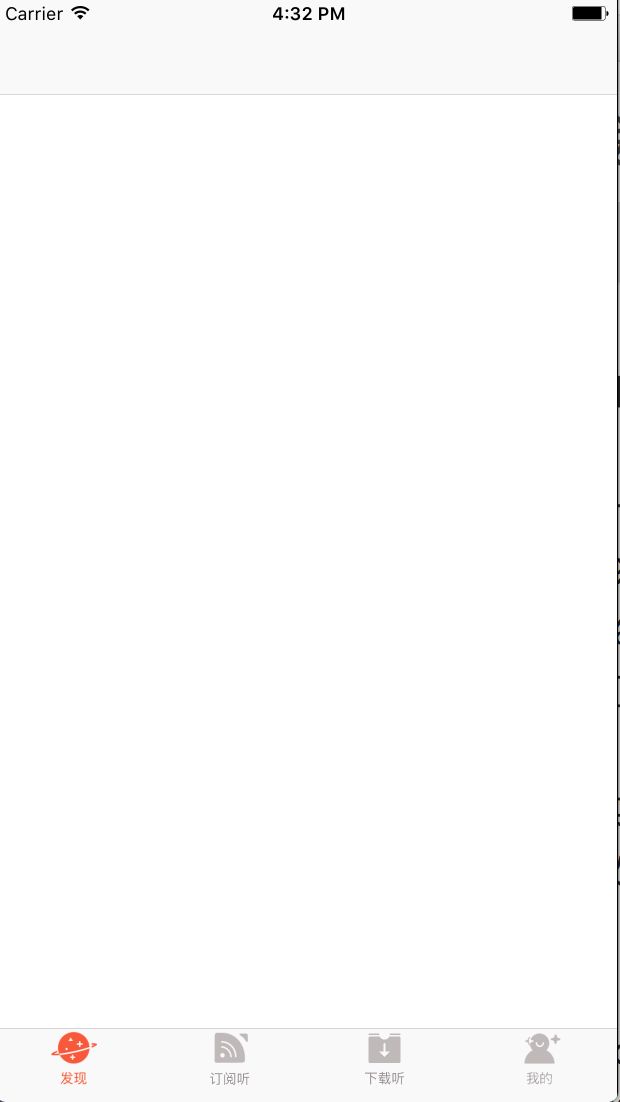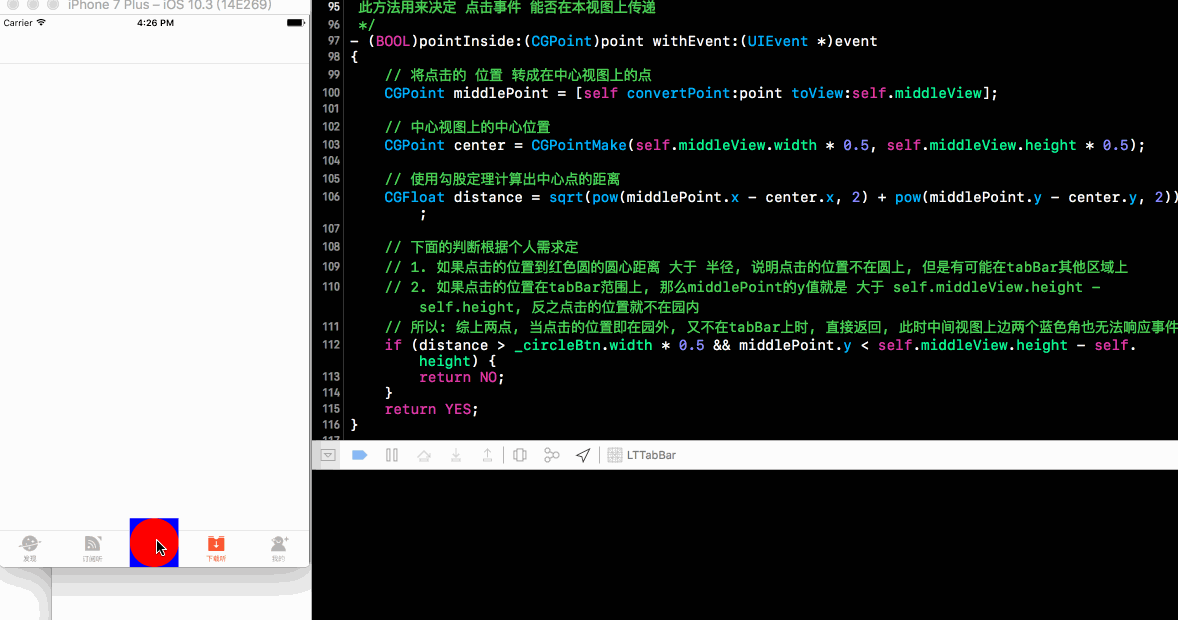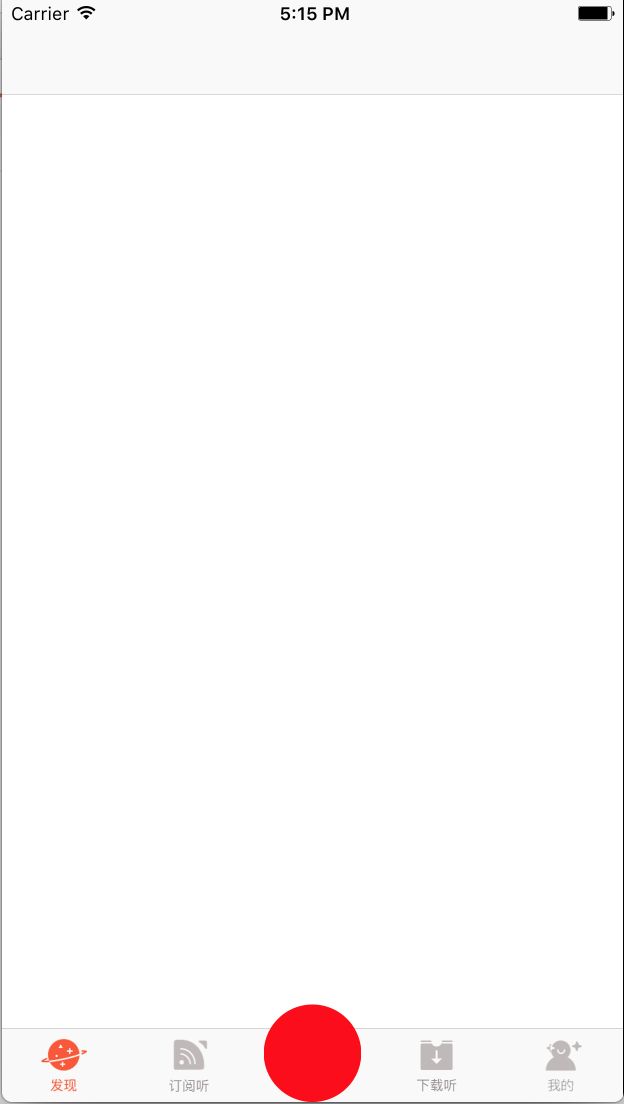下面是自定义tabBar的一种效果, 如果有错误请留言, 我会修改
一、目标
-
目标效果
- tabBar中间添加一个红色的圆形按钮, 并且按钮上所有位置都可以触发点击事件
二、实现方式
-
1: 自定义标签控制器(继承自UITabBarController), 并添加四个子控制器
- 图中的四个按钮位置靠上是因为 图片文字 整体是一张图的原因, 稍后会调整
- 2: 自定义类LTTabBar(继承自UITabBar)
- 3: 在自定义的标签控制器中使用KVC替换tabBar
- (void)viewDidLoad {
[super viewDidLoad];
// 替换掉系统的tabBar, 换成自己自定义的TabBar
[self setValue:[LTTabBar new] forKey:@"tabBar"];
}
- 在LTTabBar类中重写 layoutSubviews 方法调整四个按钮位置
- (void)layoutSubviews
{
[super layoutSubviews];
NSInteger count = self.items.count;
NSInteger index = 0;
CGFloat width = self.width / (count + 1);
CGFloat height = self.height;
// 遍历所有按钮, 调整按钮位置
for (UIView *subView in self.subviews) {
if ([subView isKindOfClass:NSClassFromString(@"UITabBarButton")]) {
// 当遇到第三个按钮(标记是2)时, 调整数值
if (index == 2) index++;
CGFloat x = index * width;
CGFloat y = 5;
subView.frame = CGRectMake(x, y, width, height);
index++;
}
}
}
-
调整后的效果图
在按钮的中间添加一个视图, 这个视图的大小根据需求而定
- (instancetype)initWithFrame:(CGRect)frame
{
self = [super initWithFrame:frame];
if (self) {
[self setUpInit];
}
return self;
}
- (UIView *)middleView
{
if (!_middleView) {
UIView *middleView = [[UIView alloc] init];
[self addSubview:middleView];
_middleView = middleView;
}
return _middleView;
}
- (void)setUpInit
{
// 设置中间视图的大小 和 颜色
// 这里颜色为蓝色, 方便看效果, 在这上面可以添加任意的视图 或者 图片
self.middleView.frame = CGRectMake(0, 0, 65, 65);
self.middleView.backgroundColor = [UIColor blueColor];
}
-
效果图
在蓝色视图上添加我们需要的红色按钮
@interface LTTabBar ()
/** 中间View */
@property (nonatomic, weak) UIView *middleView;
/** 中心的红色圆 */
@property (nonatomic, weak) UIButton *circleBtn;
@end
@implementation LTTabBar
- (instancetype)initWithFrame:(CGRect)frame
{
self = [super initWithFrame:frame];
if (self) {
[self setUpInit];
}
return self;
}
- (UIView *)middleView
{
if (!_middleView) {
UIView *middleView = [[UIView alloc] init];
[self addSubview:middleView];
_middleView = middleView;
}
return _middleView;
}
- (void)setUpInit
{
// 设置中间视图的大小 和 颜色
// 这里颜色为透明, 这样就看不见了, 在这上面可以添加任意的视图 或者 图片
self.middleView.frame = CGRectMake(0, 0, 65, 65);
self.middleView.backgroundColor = [UIColor blueColor];
// 添加红色的圆形按钮
UIButton *circleBtn = [UIButton new];
circleBtn.frame = self.middleView.frame;
circleBtn.layer.cornerRadius = circleBtn.width * 0.5;
circleBtn.layer.masksToBounds = YES;
circleBtn.backgroundColor = [UIColor redColor];
[self.middleView addSubview:circleBtn];
_circleBtn = circleBtn;
// 添加点击事件
[circleBtn addTarget:self action:@selector(circleBtnClick:) forControlEvents:(UIControlEventTouchUpInside)];
}
// 红色按钮点击事件
- (void)circleBtnClick:(UIButton *)sender
{
NSLog(@"红色按钮被点击了");
}
- (void)layoutSubviews
{
[super layoutSubviews];
NSInteger count = self.items.count;
NSInteger index = 0;
CGFloat width = self.width / (count + 1);
CGFloat height = self.height;
// 遍历所有按钮, 调整按钮位置
for (UIView *subView in self.subviews) {
if ([subView isKindOfClass:NSClassFromString(@"UITabBarButton")]) {
// 当遇到第三个按钮(标记是2)时, 调整数值
if (index == 2) index++;
CGFloat x = index * width;
CGFloat y = 5;
subView.frame = CGRectMake(x, y, width, height);
index++;
}
}
self.middleView.centerX = self.width * 0.5;
self.middleView.y = self.height - self.middleView.height;
}
@end
-
效果图 : 红色按钮可以换成需要的任意视图或图片
-
接下来需要重写方法- (BOOL)pointInside:(CGPoint)point withEvent:(UIEvent *)event来确定当用户点在什么地方时才会响应点击事件
- 目标: 点击tabBar和红色按钮上时响应点击事件
- 红色按钮有超出父视图(tabBar)的部分, 不处理的话, 超出部分没办法响应事件, 在这里处理
/**
此方法用来决定 点击事件 能否在本视图上传递
*/
- (BOOL)pointInside:(CGPoint)point withEvent:(UIEvent *)event
{
// 将点击的 位置 转成在中心视图上的点
CGPoint middlePoint = [self convertPoint:point toView:self.middleView];
// 中心视图上的中心位置
CGPoint center = CGPointMake(self.middleView.width * 0.5, self.middleView.height * 0.5);
// 使用勾股定理计算出中心点的距离
CGFloat distance = sqrt(pow(middlePoint.x - center.x, 2) + pow(middlePoint.y - center.y, 2));
// 下面的判断根据个人需求定
// 1. 如果点击的位置到红色圆的圆心距离 大于 半径, 说明点击的位置不在圆上, 但是有可能在tabBar其他区域上
// 2. 如果点击的位置在tabBar范围上, 那么middlePoint的y值就是 大于 self.middleView.height - self.height, 反之点击的位置就不在圆内
// 所以: 综上两点, 当点击的位置即在圆外, 又不在tabBar上时, 直接返回, 此时中间视图上边两个蓝色角也无法响应事件
if (distance > _circleBtn.width * 0.5 && middlePoint.y < self.middleView.height - self.height) {
return NO;
}
return YES;
}
-
效果图
此时将蓝色视图的颜色改为透明就可以了, 大家也可以根据自己的需求将红色按钮换成其他任意的视图
-
最后效果
蓝色视图的存在意义是, 方便控制红色按钮的位置, 去掉也可以
三、代码
- LTTabBar.h中代码
#import
@interface LTTabBar : UITabBar
@end
- LTTabBar.m中代码 #import "UIView+LTLayout.h"是我自定义的布局分类, UIView的分类
#import "LTTabBar.h"
#import "UIView+LTLayout.h"
@interface LTTabBar ()
/** 中间View */
@property (nonatomic, weak) UIView *middleView;
/** 中心的红色圆 */
@property (nonatomic, weak) UIButton *circleBtn;
@end
@implementation LTTabBar
- (instancetype)initWithFrame:(CGRect)frame
{
self = [super initWithFrame:frame];
if (self) {
[self setUpInit];
}
return self;
}
- (UIView *)middleView
{
if (!_middleView) {
UIView *middleView = [[UIView alloc] init];
[self addSubview:middleView];
_middleView = middleView;
}
return _middleView;
}
- (void)setUpInit
{
// 设置中间视图的大小 和 颜色
// 这里颜色为透明, 这样就看不见了, 在这上面可以添加任意的视图 或者 图片
self.middleView.frame = CGRectMake(0, 0, 65, 65);
self.middleView.backgroundColor = [UIColor clearColor];
// 添加红色的圆形按钮
UIButton *circleBtn = [UIButton new];
circleBtn.frame = self.middleView.frame;
circleBtn.layer.cornerRadius = circleBtn.width * 0.5;
circleBtn.layer.masksToBounds = YES;
circleBtn.backgroundColor = [UIColor redColor];
[self.middleView addSubview:circleBtn];
_circleBtn = circleBtn;
[circleBtn addTarget:self action:@selector(circleBtnClick:) forControlEvents:(UIControlEventTouchUpInside)];
}
- (void)circleBtnClick:(UIButton *)sender
{
NSLog(@"红色按钮被点击了");
}
- (void)layoutSubviews
{
[super layoutSubviews];
NSInteger count = self.items.count;
NSInteger index = 0;
CGFloat width = self.width / (count + 1);
CGFloat height = self.height;
// 遍历所有按钮, 调整按钮位置
for (UIView *subView in self.subviews) {
if ([subView isKindOfClass:NSClassFromString(@"UITabBarButton")]) {
// 当遇到第三个按钮(标记是2)时, 调整数值
if (index == 2) index++;
CGFloat x = index * width;
CGFloat y = 5;
subView.frame = CGRectMake(x, y, width, height);
index++;
}
}
self.middleView.centerX = self.width * 0.5;
self.middleView.y = self.height - self.middleView.height;
}
/**
此方法用来决定 点击事件 能否在本视图上传递
*/
- (BOOL)pointInside:(CGPoint)point withEvent:(UIEvent *)event
{
// 将点击的 位置 转成在中心蓝色视图上的点
CGPoint middlePoint = [self convertPoint:point toView:self.middleView];
// 中心蓝色视图上的中心位置
CGPoint center = CGPointMake(self.middleView.width * 0.5, self.middleView.height * 0.5);
// 使用勾股定理计算出中心点的距离
CGFloat distance = sqrt(pow(middlePoint.x - center.x, 2) + pow(middlePoint.y - center.y, 2));
// 下面的判断根据个人需求定
// 1. 如果点击的位置到红色圆的圆心距离 大于 半径, 说明点击的位置不在圆上, 但是有可能在tabBar其他区域上
// 2. 如果点击的位置在tabBar范围上, 那么middlePoint的y值就是 大于 self.middleView.height - self.height, 反之点击的位置就不在圆内
// 所以: 综上两点, 当点击的位置即在圆外, 又不在tabBar上时, 直接返回, 此时中间视图上边两个蓝色角也无法响应事件
if (distance > _circleBtn.width * 0.5 && middlePoint.y < self.middleView.height - self.height) {
return NO;
}
return YES;
}
@end






